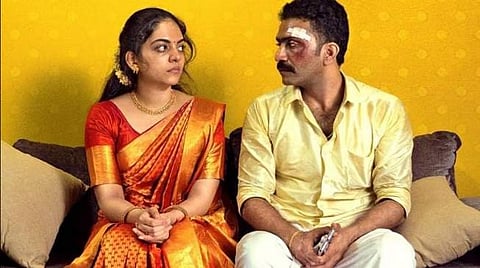Adi Movie Review: A familiar gaze into the male ego
Rating:(2.5 / 5)
Prasobh Vijayan's Adi begins with a disclaimer that says the film is inspired by hundreds of true stories. Hardly minutes into the film you know that's true because the central conflict explored here is about the fragile male ego. It's an everyday sight, especially in a patriarchal society like Kerala, to see men's egos getting bruised for the lamest of reasons. For some, it can be something as silly as claiming authority over a plate of rabbit meat, and for some, their ego can burst when someone overtakes them on the road. These male ego stories are a hot-selling property today in Malayalam cinema. Over the past decade, several filmmakers have boldly explored multiple shades of masculinity. Maheshinte Prathikaram, Kali, Ishq, Jallikattu, Driving Licence, Ayyappanum Koshiyum, Oru Thekkan Thallu Case, Kaduva, Thallumaala... it's a long list.
Cast: Shine Tom Chacko, Ahaana Krishna, Dhruvan
Director: Prasobh Vijayan
Adi is somewhat a cocktail of these films. It is scripted by Ratheesh Ravi, who has already penned a similar tale of toxic masculinity—Ishq. But unlike Ishq, which was also a commentary on the rampant moral policing prevalent in the State, Adi has low-key ambitions. The narrative begins with the marriage of Sajeevan (Shine Tom Chacko) and Geetika (Ahaana Krishna). On the fateful day of their wedding, their car hits a bike and that sets the ball rolling. Sajeevan hurls abuse at the two men on the bike, who in turn, thrash and humiliate him on road. It is a realistically choreographed scene similar to the one in Maheshinte Prathikaram where Fahadh's character gets beaten, stripped, and embarrassed in public. Sajeevan feels the same embarrassment, probably a bit more extreme, as it happens on his wedding day in front of his wife. Geetika, however, is composed and hardly makes any fuss. Her only wish is to shrug off the incident and move on. But how is it possible for Sajeevan, a typical Malayali with a wrong notion of masculinity?
Shine Tom Chacko, who has lately been loud and repetitive with his performances, does his part efficiently in Adi. Perhaps it's because the film was shot a couple of years back before his now infamous dazed-acting phase began. Shine, who was the abuser in Ishq, is at the receiving end this time. The actor shows his real mettle as brings life to Sajeevan and his complexes quite effortlessly. He does well in the portions where he tries hard to hide his vengeance-seeking self from his wife and act normal. Shine and Ahaana share good chemistry as they convincingly pull off the awkwardness of the newlyweds. Their interactions and conversations look real as it seems like most of their dialogues were done impromptu. While Sajeevan tries hard to suppress his feelings, Geetika is shown as someone with progressive thoughts and values. Unlike other films on male egos, where the conflict is solely between the men, Adi is refreshing in the sense Geetika has a say. Sajeevan's bubble bursts with a single dialogue she asks, "ennit ipo aan aayo?".
Adi is not just about Sajeevan and Geetika though. It's also about Joby aka Vellapattar (Dhruvan), a ruffian with whom the couple lock horns. Dhruvan basically repeats his alpha male role from Queen (2018) as he keeps yelling "enthaada" every third second. The film's second half begins interestingly by showing his side of the story, but it's as basic as it can get. He is the quintessential toxic boyfriend, who used to 'give freedom' to his partner but can't take rejections.
To think of it, Sajeevan and Joby share a lot of similar characteristics. They both can't stand humiliation in front of a woman. They both are desperate to prove their manliness. They both keep screaming 'njan oru aan aa'. Their conflict would've been much more gripping if Joby's character was given the same weightage and depth as Sajeevan. Such narratives get interesting when the thin line separating the hero and villain blurs, and the audience is left wondering who to root for. Ratheesh's Ishq had that ambiguity, but with Adi, he opts for a safer route with clear demarcations for the good and the bad.

